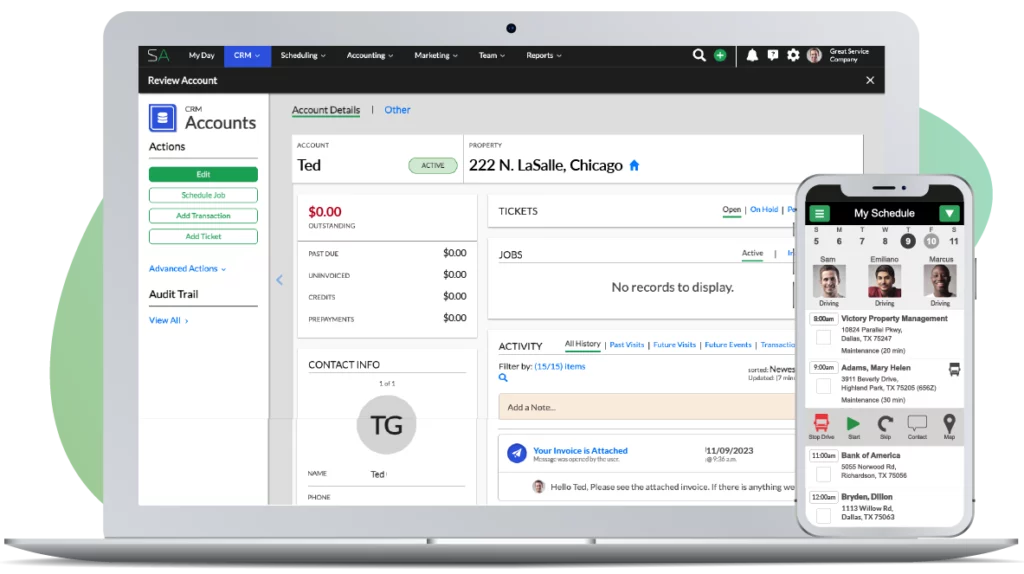If you are interested in expanding into commercial lawn care or landscape maintenance this video provides tips about selling to commercial accounts and large commercial properties.
“How do I get commercial properties when I’m just getting started in the commercial business?”
In this video, I talk about how to start selling to commercial customers.
This could be a scenario where you are just starting your lawn care business or it could be a scenario where you’re predominantly residential maintenance and now you are expanding the company into the commercial market.
The commercial market is extremely competitive and there is a lot of price pressure. You will give a lot of proposals that you will not win and you will never win them for a million different reasons.
The commercial landscape maintenance market is completely different than residential lawn care.
In residential, your contract (sell) close percentage should be significantly higher than it will be when selling commercial contracts.
Essentially, you have to quote a ton of work in commercial to win a ton of work. There is just no way around it. Even the best companies, the best commercial sales guys, are quoting a lot of work. That is how it works.
There is a sales cycle to commercial that’s far longer than residential and I will talk about the sales cycle of commercial lawn care in a different video. This video is solely about how to get started in commercial landscape and how to sell to commercial customers.
I’m not going to give you every little trick in detail. That could be an entire course in and of itself. But let me give you some pointers.
As you drive down the road and you look around, you’re going to see malls and other big commercial properties. Let’s put names to them. AMC Movie Theater, Regal Movie Theater, Home Depot, Lowe’s. You’re going to see all of these free standing stores. Chili’s, the restaurant owned by Brinker, Red Lobster, and Olive Garden. Those are all free standing buildings owned by big corporations. Then, you’re going to get into other parts of town where you see smaller stores. Maybe a Subway in a small town or a McDonald’s as a freestanding building.
When I say standing, I’m referring to the building that is a stand alone building. It is not a multi-tenant building where there’s a tenant on either side of that property. For example, a typical Subway in many markets in the US is within a multi-tenant building and there is another business on the left and right of the Subway store. And in other parts of town, you’ll see Subways as a free standing building. The same is with Starbucks. Sometimes Starbucks is a free standing building, sometimes Starbucks is within a multi-tenant building.
There are all of these different types of properties and they’re controlled by different types of people. Property management or commercial. Big corporations that manage their own property or big corporations that have essentially hired national property management companies to find them vendors. There are plenty of commercial properties out there where you deal directly with the manager of that specific property, meaning the guy that’s running that business.
In some cases you’ll deal with the guy that runs the local store, whatever that business is. And then, in other cases, the guy that runs that local store might be the owner of it. It could be the franchisee. Or, if you go into an office park, you could get into a scenario where there’s a lot of free standing buildings and you go into the front door of one of those and the company itself, maybe it’s a medical company of some form, the owner of that business also owns the real estate. In that case, you deal directly with them. He’s not using a property management company. There’s just so many scenarios.
When I got started in commercial, I started in 2 places. I started in warehouses and in commercial properties that were basically an office park of predominantly free standing buildings. I just walked door to door, not something I enjoyed at all, but it worked. I would literally walk in the front door and ask if they had a maintenance company. Eventually, I figured out that I should ask if they did have a company, when they would put it out to bid? Or when is that contract up? A lot of times they don’t know, but then you can ask for who to contact and who to talk to if you’re speaking with the front desk.
Clearly, most of the time when you walk in the front door, they have no desire to talk to you, so you should ask for a business card.
This is an effective approach but you have to go see a lot of businesses and knock on a lot of doors.
If you imagine that you could bid an office park or a free standing building where the owner might also own the real estate, it’s way easier to walk in the door and get that business than just to bid a mall. A lot of multi-tenant buildings, in my experience, are almost always managed by property management companies.
That’s why I distinguish between multi-tenant versus free standing. There’s an absolute difference. You’re rarely ever going to walk into a suite in a multi-tenant building and find out that guy in that suite is the guy that owns the building. It never happens, so you’re going to deal with the property management company in that case.
A lot of times you can call the sign to at least get your foot in the door and start working the investigative work. You can, from the leasing sign, figure out where to start. That’s usually the property management company.
Jumping around a bit here.
But, in a multi-tenant building, often times, the leasing sign is where you start to track back to determine who the property management company is in charge of the properties.
Now, back to the free standing example. It just so happens that’s where I started in both warehouses and within office buildings and by walking into some of these free standing buildings. We won an awful lot of the business.
Now, a lot of the free standing buildings turned out to be the John Deeres and other companies that maintenance decicions were made at the local store level. A good percentage would be looking for somebody. Another percentage may have someone in place but they weren’t happy with them. They would tell us to call in 4 months. Another percentage had no interest but of that, I won some.
I’m finally circling now to how to get started.
You’ve got to have some references, some examples you can point to.
I remember early on, I got the comment, “Hey, give me some addresses. I want to see some of the properties you maintain.” That was a real challenge in the beginning.
We won a number of properties in the beginning that we severely underbid because we didn’t know what we were doing. The only side benefit to that was that we at least had some clients now that we could point to and we had some references.
We also started learning about the selling process and about maintenance of these bigger properties. Now, I could talk the language when I spoke with the property management company or when I spoke with an HOA board. I knew how they thought and the questions they would ask and what was of importance to them. I learned that by getting some properties. That’s point number 1.
First, you have to just get some properties. My opinion wouldn’t be to look at the malls or the giant corporations. Go get the little stuff. Just start small.
I had some warehouses that paid 45 bucks a week to cut the lawn. That got me in, that made me start learning it. I had another commercial property just down the street that paid 125 a week. Most of them just wanted it mowed. It was a pretty simple thing. They were warehouse district, industrial park type work.
But, that got me in the door, that got me into commercial and then from there it expanded into some HOAs. My first HOA, if I remember correctly, came from one of the free standing buildings that we won. They recommended us to somebody they knew with the HOA. We ended up bidding against some other people and winning the HOA.
We first had one small office park building, just a free standing building for a medical company, and that lead to a referral to a HOA. Then, I understood HOAs and could get some other HOAs. Then, when a big condo association called based on our website, we knew the language, we knew how to do the work and we won that. It just sort of daisy chained in a sense and built itself up.
But the point was, I didn’t start with a mall or anything huge. I started with smaller stuff and grew. That’s important.
Once you know what you’re doing, you know your language, then you can start buying a mailing list. You can watch the video where I talk about who the people are that you need to talk to? Then, you could go out and buy a mailing list and market to these people.
There’s a sell cycle. It takes time.
Marketing is really important in the commercial space if you do it, but remember one little tidbit. When you’re marketing to a commercial company, you’re marketing to a human being. You’re not marketing to Home Depot or Starbucks. You’re marketing to Jim at Starbucks store number 9604. You’re marketing to Larry at the Home Depot on the west side of your town. Larry goes home and has kids and Jim goes home and his wife is frustrated with how many hours he’s putting at the store. Jim’s mad at the vendor that screwed up his parking lot when he restriped it and he’s fed up with the guy that works in the back of the warehouse that keeps screwing stuff up with the forklift.
He has problems just like you. And on Saturday he’s going to go to his daughter’s volleyball game. You’re marketing to him. You’re not marketing to Home Depot. You’re not marketing Starbucks. That’s very important to understand this.
And so, as you’re thinking about this, point number 1, start with some smaller stuff.
Point number 2, once you know what you’re doing, you can buy a mailing list and start your marketing campaign to the purchasing manager, store manager, or facility manager. You’re marketing to that person as an individual. You’re building a relationship.
This entire commercial business is all about relationships.
I used to be a partner in a big commercial cleaning company. The entire business was built on relationships. Taking guys to games, taking people to sporting events, flying them to the trade show in Las Vegas, sponsoring their kids’ sports teams. It was all relationships. We built deep relationships and we started with one property. Then, they would recommend us to others.
You win over the trust of the guy that’s running your local Home Depot store and then when his buddy in another market is fed up and done, he say “Man, you should try the guys I have. You should talk to them because I don’t have any problems anymore.” Then you get the next store, and the next store, and then eventually they recommend you to corporate office. Now, the regional manager knows about you.
That’s how it works in commercial, even in property management, that’s how it works. The property management company let’s you try a few properties. If you do a bang up job, he gives you a few more. Before long, he knows that you eliminate all the headaches in his life. By the way, you still have to give really good pricing because it’s a very price sensitive business in the commercial market. But, you earn his trust and he starts giving you more and more and more and then he knows another property management guy and he tells them about you and it grows. But, it starts slow.
If you get in with the right property management companies, this business can explode quickly. They can give you tons and tons and tons of work.
My third point to think about in getting started, is there a niche? What can you be an expert in?
In my cleaning business that I was a partner in, we were in a niche. There are a bazillion buildings in the world to clean, of all different types. We chose one specific industry to clean buildings for and we only cleaned for that industry. We got out of everything else. We became the guys in that industry and that’s how we built the business all over the United States. We became the experts for that industry.
Is there something that you could be the very best at in your market? You could be the HOA guy or the restaurant guy. I’m not saying that you should be either one of those two things but, just think about it. What could you be the best at? What is the thing that a lot of properties in your commercial market need? Is it some kind of specialized enhancement? Are there retention ponds? It’s often hard to find people to clean retention ponds so, you could be the retention pond expert which then opens the door for you to get into all kinds of other commercial properties.
Are you the expert at power washing? Something a little outside of what you do but you’re so good at it that it then opens a door for you to win other business.
I don’t know what that is, but think about the concept of the niche. What is it that you could be considered the best at. You have this giant market you want to sell to and you could shrink it down and be It when it comes to that market?
Again, it all takes a while to grow. But, then once you’re considered the guy, then everybody calls you. Everybody says, “Oh well, yeah, for me, my business is different. I need to talk to the guy that is the expert at power washing the front of hospitals. I can only deal with the guy that understands hospitals.” And you’re the guy that specializes in outdoor maintenance for medical facilities and all the security and concern that goes into that.
Think about niching as your third way to make yourself standout out and break into the commercial market. It’s a massive market and you need some way to look different. You need a portfolio of properties to present and you need all these things to really start to blow up your business and built it.
Think about those 3 points in terms of how you get started. Ignore a lot of the stuff that everybody else wants and everybody’s competing for.
Everybody wants the local McDonald’s. Everybody wants the fancy property on the corner of some big street. Everybody wants the mall. Everybody wants the fanciest HOA in the market. Everybody’s competing for that. Where can you go that not everybody is competing? Start there. Eventually, you gain the reputation and you can win the fanciest stuff. But that’s years down the road.
Basically, shrink your market, shrink your goal in some sense, and figure out where you can start. Dominate that and build from that. This is a long-term game. You are just trying to get a foot hold so you can take over.
What’s the smallest way you can get a foot hold and get it fast?




One Reply to “How To Start Selling To Commercial Customers”
Hi Jonathon, thank you for your advice with regards to getting into the commercial market. I will take it on board and start door knocking to the local real estate agents, I’m in Australia and here they handle most of the property management. Chears, Sean.